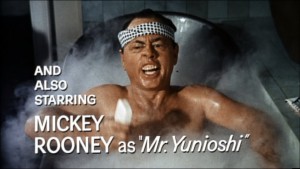 Guy Aoki who co-founded Media Action Network for Asian Americans in 1992 is taking issue with the way some in the media are using the term yellowface.
Guy Aoki who co-founded Media Action Network for Asian Americans in 1992 is taking issue with the way some in the media are using the term yellowface.
In Aoki’s own words from his column in Rafu Shimpo,”it should apply to non-Asians putting on make-up to look Asian, usually pulling or slanting their eyes and/or changing their natural skin color. Same as black face. Picture Al Jolson. You get the picture.”
We can all pretty much agree that Micky Rooney’s role in Breakfast at Tiffany’s was yellowface.
But what about Katy Perry during her geisha performance at the American Music Awards or the recent slap episode of How I Met Your Mother?
Aoki says “no.” At real issue here is Aoki doesn’t take offense to Perry’s performance or the slap episode. I won’t criticize him for that opinion. That opinion is representative of the way many other Asian Americans feel as well. We are not a monolithic group that always has to have the same opinion.
So where do we draw the line and should the line continue to move? The term Asian American has changed over the years. When it first was coined in the 60’s, it was used largely to represent East Asian Americans because those were the largest Asian American groups at the time. It’s since been expanded to include Filipino Americans, Pacific Islanders, Indian Americans and many other South Asian American groups.
How we define something in the 60s is not necessarily the same say something in defined in the next century.
Could the same be said about how we define yellowface?
The word was coined by the Asian American community and belongs to the Asian American community.
It doesn’t belong to one group or individual.
If today’s younger generation of Asian Americans has given the term new meaning, or moved the line a bit, so be it.
What’s important is that we explore these issues and continue to discuss them.
David Henry Hwang explored these issues in his play Yellow Face.
He told the Washington Post in an article published today that “it’s never okay to cast a Caucasian actor in the role of a minority, but it’s good in the reverse,” said Hwang. “Because one helps to level the playing field and the other keeps the playing field unfair.”
The discussion of race is never easy. Inevitably, someone is offended when you discuss these issues. But if we are to move on to a post racial America, we must first address these lingering issues that we often run away from discussing. Yellowface is one of those issues.



